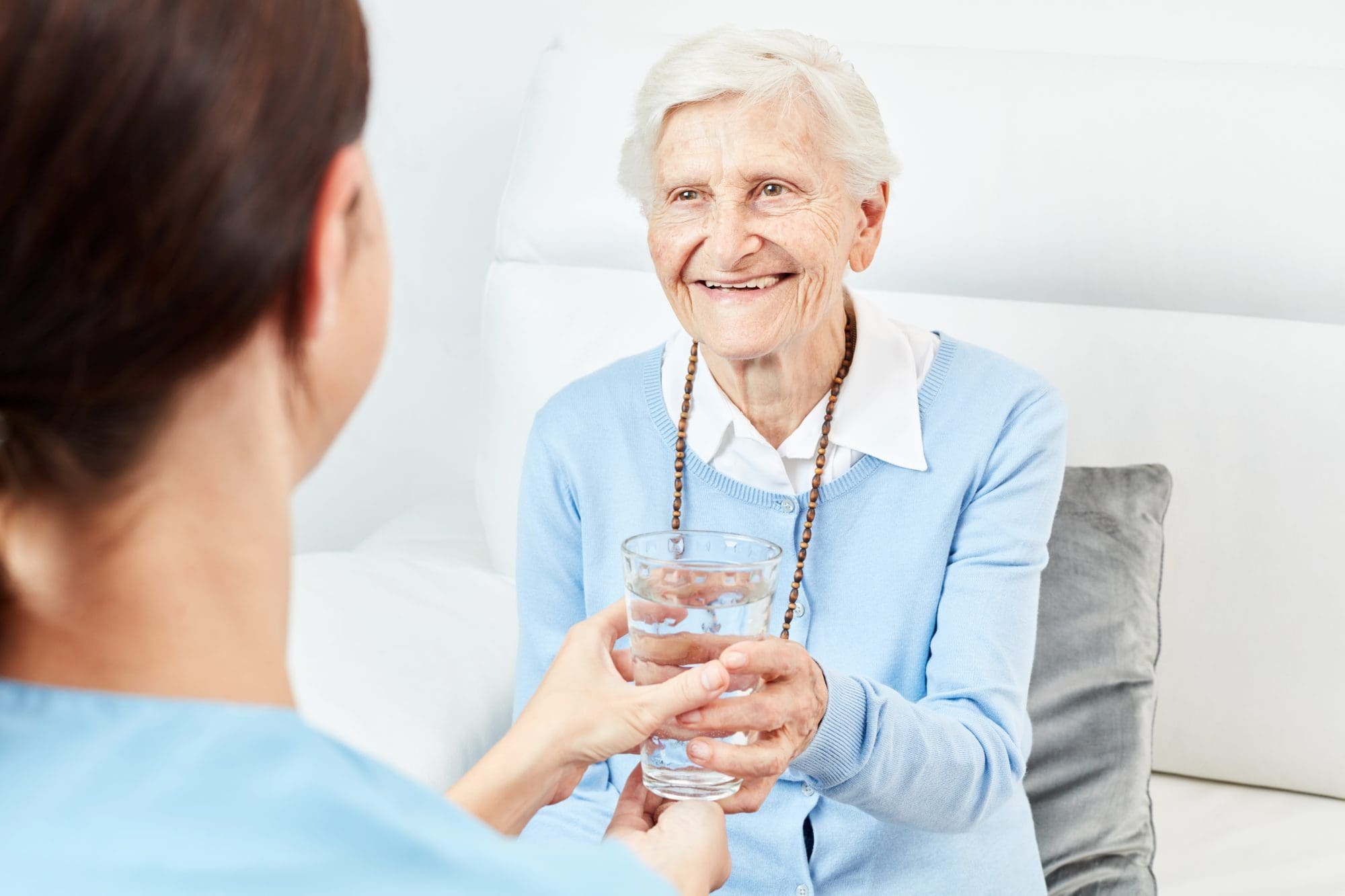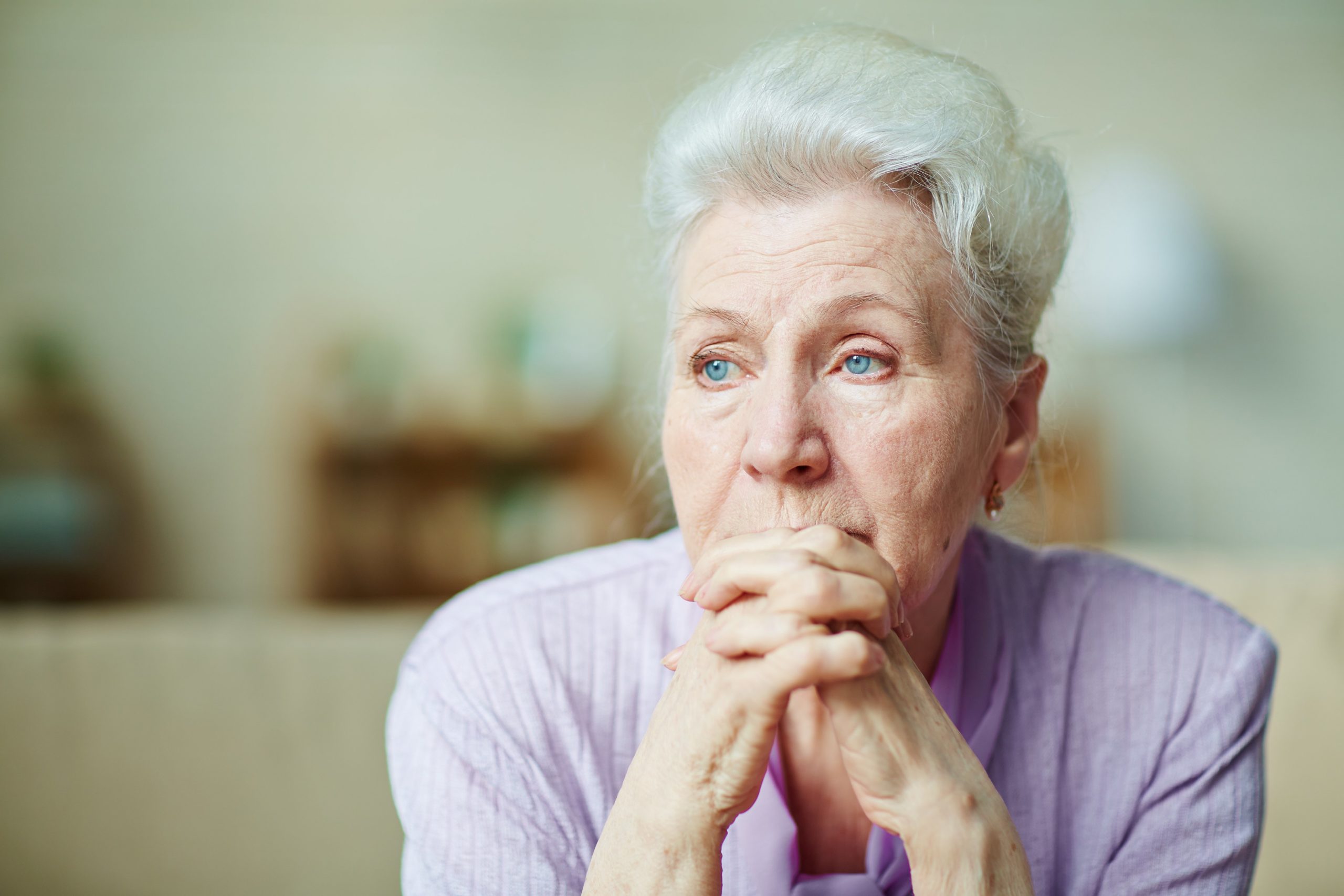Dehydration: How It Begins
Jane rocks listlessly in the shade of the porch. It’s very hot and Jane has been complaining of dizziness. Her daughter brings her a glass of lemonade. Despite the heat, her skin is dry. Jane’s daughter kneels beside the rocking chair and pinches her mother’s pointer finger. “One, two, three,” she counts silently in her head.
This might seem strange, but Jane’s daughter is doing something called the capillary nail refill test. (Source) Jane’s daughter can see that her mother may be showing the early signs of dehydration. Can you spot the signs too?

Dehydration: Knowledge Equals Power
Recognizing dehydration may seem like a no-brainer. We all know the saying: if you’re thirsty, you’re already dehydrated. (Baylor College of Medicine) However, studies have shown that thirst isn’t necessarily the first warning sign. Everyone is different, and, although there is a list of common symptoms, not everyone displays the same ones. This is especially true if your loved one has other long-term ailments. Ruling out dehydration can be an important step in whether or not you seek emergency medical attention for a pre-existing condition.
Dehydration in seniors can happen quickly, especially in the hot summer months. Your senior loved one naturally has less water in his or her body. Pre-existing conditions, hot weather, and salty foods are just some of the things that can cause them to have even less. Side effects to certain necessary medications can cause loose bowels or even, in some cases, diarrhea. Every year seniors are hospitalized for infections, fractures, and falls related to dehydration.
Depending on the health of your loved one, you may feel completely qualified to treat mild to moderate dehydration at home. Or you may feel he or she needs emergency medical attention.
The good news is that dehydration is easily identified and can be treated quickly and effectively. The best person to prevent it is you and prevention is the best medicine. As someone with a close relationship with a senior, learn their unique early warning signs. A simple reminder to drink more water throughout the day may be all he or she needs. Offering a glass of water or a cup of tea periodically is also helpful.
Thankfully, there are a few common symptoms you can look out for. If your loved one doesn’t display one symptom, he or she may be more prone to another. It’s good to have a few symptoms in your mental toolbox to rifle through as needed.
Symptoms of Dehydration: Mild, Moderate, Severe
Remember Jane? She was showing three signs of mild to moderate dehydration. The story began with Jane rocking “listlessly”. Lethargy or low spirits can be an early warning sign. This kind of fatigue, especially on a hot day, is a good indication that your loved one needs a glass of water and a rest. This can also be a sign of moderate to severe dehydration, depending on the energy level of the Jane in your life.
Jane was complaining of dizziness. When you don’t get enough water, your blood pressure drops which causes lightheadedness. (Source) Seniors often already have problems with low blood pressure. So this complaint should be taken seriously. If unsteadiness is not common in your loved one, find a quiet place for them to rest and get some fluids. This is a good time to replenish electrolytes with Gatorade, Pedialyte, or clear broth.
The third red flag was Jane’s skin. It was dry. The body’s natural reaction to heat is to sweat. Not sweating is an indication that something in the body is wrong. It could mean there isn’t enough liquid in the body to sweat out. During cooler weather, try and keep track of your loved ones trips to the bathroom. Not as many trips may equal dehydration.
Perhaps Jane has a pre-existing condition with symptoms that mimic dehydration. Low blood pressure, low blood sugar, and the side effects of some medications are just a few of the things that could do that.
Another good way to test for dehydration is the capillary nail refill test. This is not 100% accurate, but it’s a quick way to gauge the hydration level of you or your loved one. If he or she has had enough fluids, but still has symptoms, consult your doctor for answers.
Hold your loved ones hand above their heart and gently squeeze the tip of a finger until it turns white. As the blood flows back into the finger, the nail will turn back to its original pink. If it takes any longer than 2 seconds, your loved one needs water.
Let’s take a moment to talk about severe dehydration. The symptoms can include these:
- Confusion
- Irritability
- Severe dryness
- Dizziness
- Dark-colored urine
- Bloody stool
These symptoms of severe dehydration are all very good reasons to call 911. Get help immediately if your loved one has frequent diarrhea, or can’t keep fluids down. If he or she is exhibiting mild signs of dehydration, but you feel these symptoms are severe for him or her, then get help. You know your loved one best.
Treating Dehydration: It’s As Simple As a Glass of Water
Once you’ve determined your loved one is dehydrated, here are some simple steps to help. The best ways to fight it is to not let it occur in the first place. Simply make sure your loved one has small amounts of fluid available to them throughout the day. Dehydration occurs over time and constant, continual hydration can keep it at bay.
If your loved one does become dehydrated, clear fluids are best. Electrolytes are lost when the body sweats. So, it’s especially important during hot weather to replenish those with Gatorade, Pedialyte, or clear broth.
Don’t drown dehydration with large amounts of water. Guzzling water may cause a stomach ache. Again, it’s better to give the normal amount of water more often.
Rehydration doesn’t have to be tedious. A cup of herbal or decaffeinated tea, a popsicle, or a bowl of Jell-O can be a fun and important way to help your loved one take care of themselves. Caffeine is a diuretic, so, it’s best to avoid coffee or caffeinated tea unless it’s a treat. Having a hydration schedule is also helpful. A schedule can remind both you and your loved one to drink more water.
Dehydration comes on quickly and it can cause major issues. Seeing someone you care about lethargic or dizzy can be upsetting. Thankfully, it only takes a few simple steps to help a loved one stay hydrated and healthy.
At Home Care provides expert services and peace of mind. Request a free consultation today to get started.



